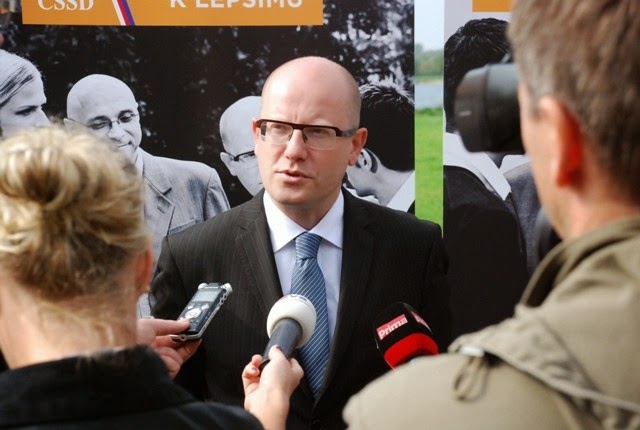The announcement three weeks ago that Prague is prepared to transfer 360 hectares of territory to Poland in the Těšín Silesia area is the latest indication that the border changes in the former Soviet and Yugoslav spaces are sparking new questions about borders in the northern portion of Eastern Europe, according to Aleksey Fenenko.
On March 6, the Moscow State University international relations specialist notes in an article in “NG-Dipkuryer,” Czech Prime Minister Bohuslav Sobotka announced the transfer, something he said would end a territorial dispute between the two countries that has been going on since 1958.
Because Sobotka provided no additional details and because the amount of land involved was so small, his words attracted relatively little attention. But Fenenko argues that border disputes are endemic in the region and that “the wave of de-Stalinization” at the end of the 20th century “has led to the de-legitimization of the borders of the 1940s.”
That is because, he continues, “for public opinion of these countries, references to the fact that the borders were established by ‘Stalin’s USSR’ is sufficient to recognize their illegitimacy.” The EU has been able to quiet “but not stop the process of their review.” And after the Těšín Silesia case, “the process is starting to take on a practical character.”
“Up to the present,” Fenenko says, “border changes have taken place in the Balkans and the territory of the former USSR. In Central Europe, on the contrary, the borders of the 1940s have been preserved.” He suggests that “the disintegration of Czechoslovakia … did not change the situation since it occurred quickly along administrative borders within the country.”
Now, however, “the situation is changing,” the Moscow specialist says, as the Těšín Silesia shows. Warsaw and Prague, under pressure from the Entente agreed to the border in 1920. But both sides had problems with it, and immediately after Munich in 1938, Poland demanded and got a border adjustment in its favor.
In 1947, following the Soviet occupation of the entire area, Poland and Czechoslovakia signed an accord that largely restored the 1920 border; but Poland later tried to make greater changes, something Czechoslovakia rejected. In any case, the small adjustment announced now highlights the reality that “Poland and the Czech Republic have a problem” with borders.
The 1938 Munich agreement between Hitler and Chamberlain is “traditionally viewed in Europe exclusively in a negative way.” Any reference to it, including by Moscow, Fenenko says, represents a kind of “’red line’” that must not be crossed. But Prague’s action this month has the effect of implicitly and partially rehabilitating of part of Munich.
Could this prompt other countries in Central Europe, and especially Hungary, to raise similar issues, Fenenko asks. The answer is far from clear. Germany isn’t going to question its borders: the current ones are too much part of that country’s self-definition. But the situation with regard to Lithuania may be different.
The current Polish-Lithuanian border follows a line established by the Soviet-Polish treaty of August 16, 1945, but “problems of the border delimitation between Poland and Lithuania remain,” the Moscow scholar says, with each side having claims to portions now within the borders of the other.
On the one hand, many in Lithuania consider portions of Poland and Russia’s Kaliningrad oblast to be part of Little Lithuania. And many Poles still remember when Vilnius was within Poland, not Lithuania. As a result, Fenenko says, “Warsaw could activate discussions about the principles of the delimitation” of the border.
There is also the possibility of disputes between Poland and Ukraine. According to the 1945 Soviet-Polish treaty, Poland gave up territories to the Ukrainian SSR;” and “officially, Warsaw has refrained from advancing demands on Ukraine.” But that doesn’t end Ukraine’s western border problems: it also has them with Moldova.
The most serious set of border issues involve Hungary and Hungarians. After 1945, some of Hungary’s lands were handed over to Romania, others to Yugoslavia, still others to Czechoslovakia and the USSR. In 1991, Budapest began talking about the formation of “a Greater Hungary” that would reunite all of these.
The US blocked that at the time by promising Hungary eventual NATO membership if it refrained. But, Fenenko points out, “over the last few years,” discussions of this kind in Budapest have “intensified.” Budapest now has problems with Romania, Slovakia and Ukraine, problems it has exacerbated by demanding autonomy and offering dual citizenship
to ethnic Hungarians.
Now, given “the precedent of the Polish-Czech negotiations,” the Moscow specialist continues, “Budapest in the future may achieve the establishment of a negotiation framework with Ukraine about the provision of particular rights to Hungarians” in that country.
Fenenko’s article is important for three reasons:
- First, it is clearly an effort to set the stage for Russian demands for border changes by suggesting that this is not a “Moscow problem.”
- Second, it suggests that some in the Russian capital are interested in promoting such conflicts as a way of expanding Moscow’s influence over the region.
- And third, it is a reminder that the West, having failed to stop Russia’s “territorial” adjustments in Georgia in 2008 or in Ukraine in 2014, has opened the door not only to Vladimir Putin but to other leaders around the world who may decide that the era of fixed borders is over and that they have everything to gain by seeking to expand their own.

